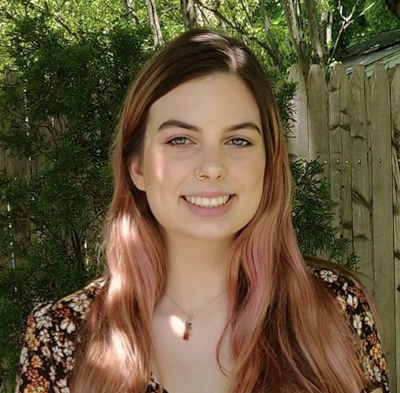
Halle Berger, a marine sciences doctoral student at the University of Connecticut, is one of 10 early career scientists awarded the 2024 National Marine Fisheries-Sea Grant Fellowship that provides support for critical fisheries research.
Connecticut Sea Grant was involved in the selection process and will oversee the fellowship as Berger works with UConn faculty advisors and National Oceanic and Atmospheric Association (NOAA) mentors.
“I’m super excited about this because I know this was fairly competitive,” said Berger, who became interested in marine science as a middle school student attending the Sea Lab summer camp in her hometown in New Bedford, Mass., home to one of the largest commercial fisheries in the Northeast. “This provides me a source of funding to continue my research that I’ve been doing and to dive into the fisheries management side of things.”
Berger began working on her doctorate in 2022, focusing her research on the Atlantic scallop fisheries, after a year as a Sea Grant John A. Knauss fellow. The new fellowship, she said, will provide her with the resources to complete her PhD under the guidance of Samantha Siedlecki and Catherine Matassa, marine sciences professors at UConn, and two Northeast Fisheries Science Center experts, Shannon Meseck and Dvora Hart.
Specifically, her research involves using existing datasets and models to evaluate the impact of changing ocean conditions on the population dynamics of sea scallops, one of the most valuable fisheries in the United States. She plans to integrate key environmental factors and potential management strategies into current stock assessment models, to enhance the long-term sustainability and resilience of the fishery.
“Halle is an outstanding scholar and a former NOAA Sea Grant Knauss Fellow,” said Syma Ebbin, research coordinator at Connecticut Sea Grant. “She is the first UConn student to receive the prestigious NOAA Fisheries/Sea Grant Population and Ecosystem Dynamics fellowship and I know she will achieve her research goals. Her research is cutting edge and likely to have real impacts on the knowledge and practice of sea scallop management.”
The NMFS-Sea Grant joint fellowship program has supported more than 160 fellows since its creation in 1999. It provides an important opportunity for career development for program alumni, who go on to hold key roles in NOAA fisheries, other agencies, academic institutions and fishery management councils.
“Halle makes us proud, earning not one but two consecutive highly competitive national fellowships,” said Sylvain De Guise, Connecticut Sea Grant director. “I am glad we can contribute to supporting outstanding young scientists through NOAA fellowships that our program manages.”
Connecticut Sea Grant, based at the UConn Avery Point campus in Groton, is one of 34 Sea Grant programs supported by NOAA in coastal and Great Lakes states that encourage the wise stewardship of our marine resources through research, education, outreach and technology transfer.
More information: Judy Benson, CTSG communications coordinator: judy.benson@uconn.edu